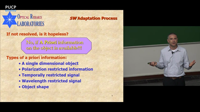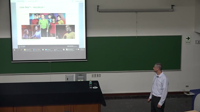Coloquio de Física - Frontiers in super resolution microscopy: bio-imaging
Departamentos Ciencias - Sección Física
Ponente: Zeev Zalevsky (Bar-Ilan University, Israel) Digital imaging systems and the human vision system have limited capability to separate spatial features. Therefore, their imaging resolution is limited. The reasons for this limitation are related to the effects of diffraction, i.e., the finite dimensions of the imaging optics, the geometry of the sensing array and its sensitivity, and the position of the object itself, which may be out of focus. In this talk I will first present novel photonic approaches and means to overcome these limitations and eventually allow us to have super-resolved imaging systems. Then I will demonstrate a novel, extended depth-of-focus concept based on the interference effect, applied to ophthalmic usage and implemented on conventional refractive devices, such as spectacles, contact lenses, and intraocular lenses. This technology is capable of simultaneously correcting various refractive errors, such as myopia, hyperopia, presbyopia, regular and irregular astigmatism, and their combinations. Finally, I will discuss a special device mounted on spectacles that translates visual information into spatial tactile stimulation of the cornea. This device can let blind people "see" by providing them with a non-invasive sensory substitution. Blind people may perceive images after teaching them to associate the tactile spatial feeling of the stimulation of their cornea to real spatial shapes and images.
Lista de Reproducción
34 Vistas
coloquio fisica pucp 2019 israel optica microscopia oftalmologia lente ojo medicina tecnologia
Expositores
Archivos
| coloquio_2019_03_27_... | 505.04 KB |




